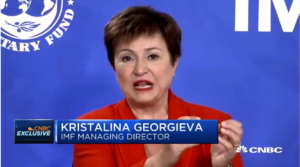
CNBC Exclusive: CNBC Excerpt: IMF Managing Director Kristalina Georgieva speaks with CNBC’s Sara Eisen on “Closing Bell” today about the need for more fiscal stimulus to close the gap between markets and the economy.
Q2 2020 hedge fund letters, conferences and more
IMF Managing Director Kristalina Georgieva Says There’s A Disconnect Between Markets And The Real Economy
All references must be sourced to CNBC.
Kristalina Georgieva: It is less dire, but dire nonetheless. And the reasons is two. One, very effective central bank action, massive liquidity injection, positive spillover for some emerging markets that we’re able to return to borrow. And two, adjusting to function with the pandemic still around us. What we see is eurozone, the U.S., doing better than we feared. China surprising on the upside.
Eisen: What about this concern about a second wave? It’s happening in Europe, happening to some extent in the united states. If we do get a full-blown second wave of the virus, what does that do to the economic recovery?
IMF’s Kristalina Georgieva: We are projecting the recovery to be partial, uneven, uncertain. Exactly because we do not yet have a definitive exit from the health crisis. Therefore, if we are hit as we are now actually being hit by sparks of coronavirus infections, that is slowing down the recovery. But governments have learned how to zero on areas where there are spikes. Many are doing better now than in the beginning of the crisis. And there is more in terms of medical capacity than we had a couple of months ago. That all helps to not get to a complete lockdown which we don’t anticipate happening. Although of course we have to see how the winter impacts adjusting to the pandemic
Eisen: Is a v-shaped recovery still possible?
IMF’s Kristalina Georgieva: What we are facing is multiple letters in multiple places. For a very small number of countries that have been successful to contain the pandemic and are doing effectively better in restarting or actually sustaining their economies, v-shape is possible. But these are very few cases. Most countries are going to be faced with uneven recovery and we see in many cases a “k,” with parts of the economy doing really well, and other parts contracting dramatically.
Eisen: How badly do you think the U.S. Economy needs more stimulus right now?
IMF’s Kristalina Georgieva: The U.S. Economy has done really well by injecting two trillion in fiscal stimulus and also by incredibly decisive action from the fed. The U.S. Has fiscal space. Given that we are not out of the woods yet, continued support is necessary and the good news is the U.S. Can afford it. The sooner the better so we don’t risk bankruptcies and unemployment coming because of premature withdrawal of support. And that is actually the core of our message – do not cut lifelines prematurely.
Eisen: What was your reaction upon hearing that President Trump was diagnosed and hospitalized with covid-19? And do you think it impacts this outlook we’re talking about for the U.S.?
IMF’s Kristalina Georgieva: It is very hard for anyone, any family that gets impacted by coronavirus and of course like everybody else, I wish the president and the first lady speedy recovery. It seems like they are on that part. It is the strength of the U.S. Economy that has helped not just the U.S., but the rest of the world in this crisis. What we have seen is quite remarkable in terms of what decisive action in the U.S. Meant for preventing a dramatic collapse of companies and increase in unemployment, but also how the U.S. Has been effective in supporting the rest of the world. We have seen this by the extension of swap lines by the fed to other countries, much helping to sustain financial stability globally. We benefited from it at the IMF because U.S. Included in the first fiscal stimulus, the two trillion stimulus, support for the borrowing capacity of the IMF. So, it is a very important country and it has helped the world by simply doing better to come out of this crisis.
The post IMF’s Kristalina Georgieva: More Fiscal Stimulus Is Needed To Close The Gap Between Markets And The Economy appeared first on ValueWalk.
